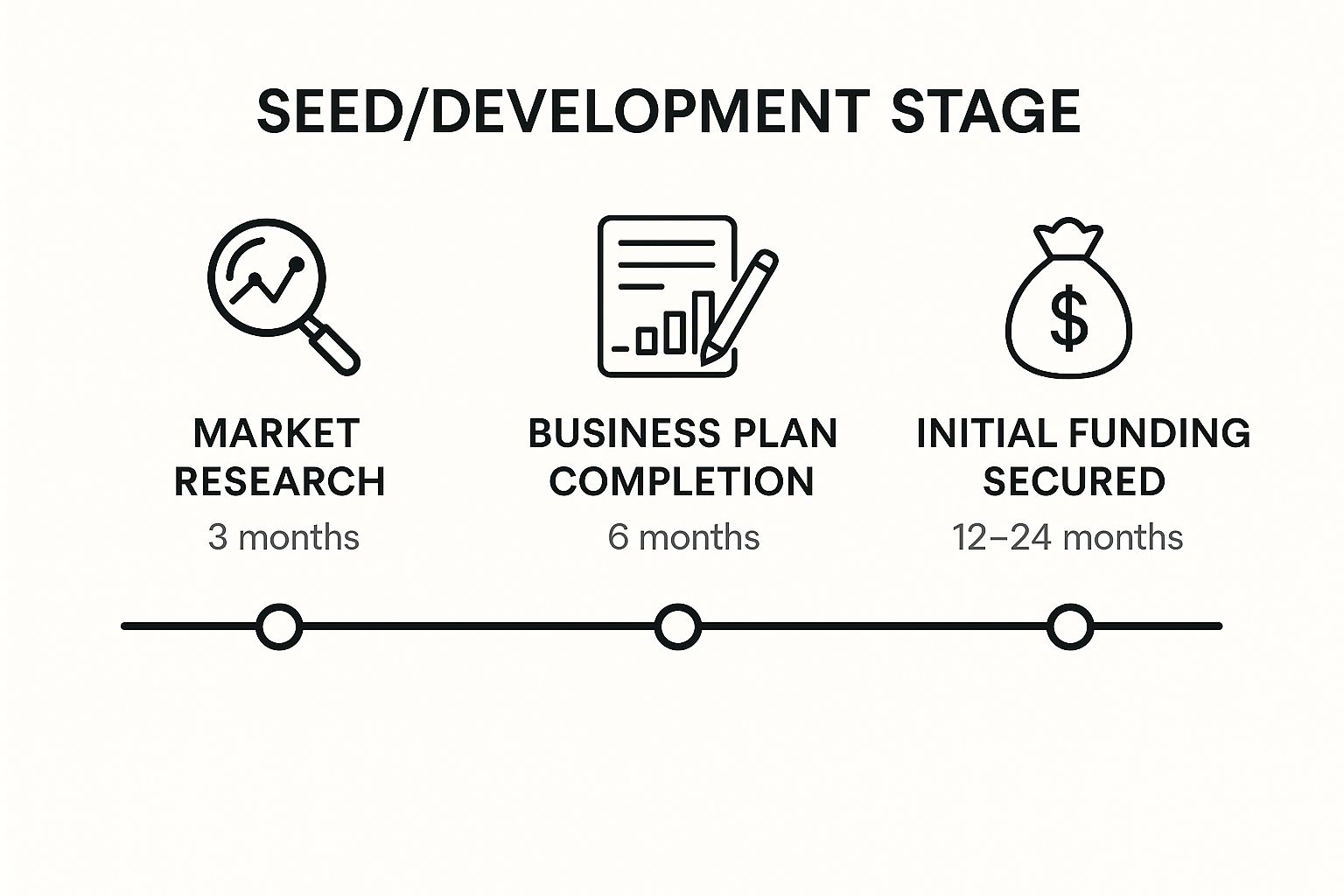
Don’t Pay Provisional Tax Blindly: 3 Smart Moves Before August 28th
August 13, 2025
How to Read a Balance Sheet for Dummies: Easy Tips
August 20, 2025Navigating the 6 Business Life Cycle Stages
Understanding the business life cycle stages is crucial for success in the Auckland market. This listicle outlines the six key stages: Seed/Development, Startup, Growth, Expansion/Maturity, Decline, and Renewal/Exit. Knowing where your business sits within these business life cycle stages allows you to anticipate challenges, adapt your strategies, and maximize your potential. This guide will help you navigate each stage effectively, from initial launch to long-term growth or a successful exit.
1. Seed/Development Stage
The seed/development stage represents the very beginning of a business’s life cycle, a crucial phase for any Auckland business hoping to thrive. During this stage, the business exists primarily as a concept or idea that the founder(s) are developing. The main focus is on validating the business idea, conducting thorough market research, crafting a solid business plan, and securing initial funding to bring the concept to life. This is where you lay the groundwork for your future success, much like planting a seed that you hope will grow into a strong and healthy tree. This stage is critical in the business life cycle stages as it determines the viability and direction of the entire venture.

At this stage, your Auckland business might exist only as a concept, with no formal structure or operations. Features of this stage include: focusing on market research and validating your business concept, developing your initial business plan, and experiencing minimal, if any, revenue generation. Think of Sara Blakely sketching her initial Spanx designs, Steve Jobs and Steve Wozniak building the first Apple computer in a garage, or Mark Zuckerberg developing Facebook in his dorm room. These are all prime examples of the seed/development stage.
Pros of the Seed/Development Stage:
- Low overhead costs and financial risk: Since your business is still in its infancy, you likely have minimal expenses.
- Flexibility to adjust business model: You have the freedom to pivot and refine your business model based on market research and feedback.
- Opportunity to research market thoroughly before launch: This minimizes the risk of launching a product or service that doesn’t meet market needs.
- Time to build strong foundation and business strategy: This sets the stage for long-term success.
Cons of the Seed/Development Stage:
- No revenue generation: You won’t be making money during this phase.
- High uncertainty about viability of business concept: There’s always the risk that your idea might not be successful.
- Difficulty securing funding without proven concept: Investors can be hesitant to invest in unproven ideas.
- Founder(s) often self-funding (bootstrapping): This can put a strain on personal finances.
- High failure rate at this stage: Many businesses don’t make it past the seed stage.
Tips for Success in the Seed/Development Stage:
- Conduct thorough market research to validate your business concept: This is crucial for understanding the Auckland market and tailoring your business accordingly.
- Create a detailed business plan with realistic financial projections: This will be essential for securing funding and guiding your business’s growth.
- Network with potential investors and mentors in Auckland: Local connections can provide invaluable support and resources.
- Consider bootstrapping initially to maintain control: This can be a good strategy until you’re ready to seek external funding.
- Protect your intellectual property through patents, trademarks, etc.: This protects your unique ideas and innovations.
- Develop a minimum viable product (MVP) to test with potential customers: This allows you to gather feedback and refine your offering before a full launch.
The seed/development stage deserves its place in the business life cycle because it’s the foundation upon which all future growth is built. It’s a time of experimentation, learning, and refinement, ultimately preparing your Auckland business for the challenges and opportunities that lie ahead. By focusing on these key elements, you can increase your chances of navigating this stage successfully and building a thriving business in Auckland.
2. Startup Stage
The Startup Stage is a crucial phase in the business life cycle stages, marking the transition from a mere idea to a functioning entity in the market. For small businesses in Auckland, understanding this stage is paramount for navigating the challenges and capitalizing on the opportunities it presents. This stage begins when your business officially launches and starts operating. It’s no longer just a concept; you have a legal structure, a team, and are actively selling products or services to customers. This phase is all about establishing your presence in the Auckland market, fine-tuning your business model, and laser-focusing on acquiring customers and generating those first crucial revenues.
What defines the Startup Stage?
Several key features characterize a business in its startup phase:
- Legal Business Entity Established: You’ve formally registered your business, whether as a sole proprietorship, partnership, or limited company. This provides legal protection and credibility.
- Initial Product/Service Launch: Your core offering is available to customers in the Auckland market. You’ve moved beyond testing and are actively seeking sales.
- Small Team: The team likely consists of founders and a few early employees, all wearing multiple hats and contributing across different areas.
- Focus on Customer Acquisition & Product-Market Fit: The primary goal is to attract customers and validate that your product or service meets a real market need in Auckland.
- Early Revenue Generation: Sales are starting to trickle in, but profitability is likely still down the road.
- High Burn Rate: Expenses are often high relative to revenue as you invest in marketing, product development, and operations.
Pros and Cons of the Startup Stage:
Like any stage in the business life cycle, the Startup Stage has its advantages and disadvantages:
Pros:
- Real-World Validation: You get to test your business idea in the Auckland market and gain invaluable feedback.
- Customer Feedback & Iteration: Direct interaction with customers allows you to refine your offerings based on real-world needs and preferences.
- Brand Building: You begin to establish your brand presence and reputation in the local Auckland community.
- Increased Investor Appeal: A launched business with some traction is more attractive to investors than a concept alone.
- Team Momentum: The excitement and innovation of a new venture can create a highly motivated and driven team environment.
Cons:
- Cash Flow Challenges: Limited resources and high initial expenses can lead to cash flow difficulties.
- Operational Uncertainty: The early stages are characterized by uncertainty, requiring frequent adjustments and “pivots” in strategy.
- Resource Constraints: Time, money, and talent are often limited, requiring careful prioritization.
- Intense Competition: You’ll face competition from established businesses and other startups in the Auckland market.
- Management Inexperience: Founders may lack experience in certain areas, leading to inefficiencies.
- Founder Burnout: The long hours and high pressure can take a toll on founders’ well-being.
Tips for Navigating the Startup Stage:
For Auckland small businesses, these tips can help navigate the startup stage successfully:
- Product-Market Fit is Key: Focus relentlessly on understanding your Auckland target market and ensuring your product/service meets their needs.
- Manage Cash Flow Carefully: Monitor your runway closely and maintain lean operations to extend your cash reserves.
- Build a Versatile Team: Hire team members who are adaptable and willing to wear multiple hats.
- Gather Customer Feedback: Implement systems for collecting and analyzing customer feedback to inform product development and marketing strategies.
- Stay Agile: Be prepared to pivot your business model or offerings based on market response and customer feedback.
- Network Strategically: Build relationships with key stakeholders, potential investors, and mentors in the Auckland business community.
- Prioritize Customer Satisfaction: Focus on building a loyal customer base by providing exceptional service and exceeding expectations.
Why the Startup Stage Matters:
The Startup Stage is fundamental to the business life cycle because it validates the core business concept and lays the foundation for future growth. Successfully navigating this stage sets the stage for expansion and long-term success in the competitive Auckland market.
3. Growth Stage
The Growth Stage is a critical phase in the business life cycle stages, marking a period of rapid expansion and increased market presence. For small businesses in Auckland navigating this exciting yet challenging period, understanding the dynamics of the growth stage is crucial for sustained success. This stage follows the startup phase, where the business has successfully proven its product-market fit and is now ready to scale its operations. This translates to a significant increase in customers, revenue, and often, market share. The primary focus shifts from mere survival to efficiently managing this rapid growth, strategically expanding into new markets, and establishing robust operational systems capable of supporting a larger scale of operations.

Features of the Growth Stage:
- Proven Business Model: A clear demonstration of product-market fit is a defining characteristic. Your Auckland business has found its niche and demonstrated consistent demand.
- Significant Revenue Growth: Expect consistent increases in revenue, often exceeding 20% annually.
- Expanding Customer Base & Market Penetration: You’ll see a surge in new customers and deeper penetration into existing markets within Auckland and potentially beyond.
- Growing Team & Organizational Complexity: As your business grows, so will your team. This necessitates the development of more structured organizational systems and processes.
- Formal Business Processes & Systems: Ad-hoc processes won’t cut it anymore. Implementing CRM systems, project management tools, and formalized financial procedures becomes essential.
- Increasing Profitability or Path to Profitability: While reinvestment is crucial for growth, a clear path to profitability should be established.
- Larger Funding Rounds (Series B, C, etc.): Access to larger funding rounds becomes more feasible, providing capital to fuel further expansion.
Pros of the Growth Stage:
- Validation of Business Model: Market traction provides strong validation of your business model, instilling confidence for future endeavors.
- Increased Revenue & Potential for Profitability: The growth stage offers significant potential for increased revenue and profitability, providing resources for reinvestment and expansion.
- Greater Access to Capital: Increased revenue and market share make your business more attractive to investors, opening doors to more funding options.
- Attracting Top Talent: A successful, growing business is a magnet for talented individuals looking to be part of something big.
- Economies of Scale: As production increases, businesses can often leverage economies of scale to reduce costs and improve efficiency.
- Brand Recognition & Credibility: Growth enhances brand recognition and market credibility, strengthening your position within the Auckland business landscape.
Cons of the Growth Stage:
- Growing Pains & Organizational Challenges: Rapid growth brings challenges, including internal communication breakdowns, resource allocation issues, and the need for constantly evolving organizational structures.
- Need for Significant Capital: Expansion requires capital investment in infrastructure, marketing, and talent acquisition, potentially straining resources.
- Increased Complexity: Operations and decision-making become more complex, requiring specialized skills and expertise.
- Potential Dilution of Company Culture: Rapid hiring can dilute the carefully cultivated company culture, making it essential to prioritize cultural integration.
- Intensified Competition: Success attracts competition. Be prepared to face increased rivalry as other businesses try to capitalize on your market success.
- Pressure to Maintain Growth: The pressure to sustain high growth rates can lead to hasty decisions and strategic mistakes if not managed carefully.
Tips for Navigating the Growth Stage:
- Invest in Scalable Systems: Implement robust systems and infrastructure, including CRM, project management software, and cloud-based solutions, to handle increased workload and data.
- Develop Middle Management: Empower middle management to handle the growing team and delegate responsibilities effectively.
- Focus on Core Offerings: Maintain focus on your core products and services while strategically expanding product lines based on market demand.
- Implement Financial Controls: Establish formal financial controls and reporting procedures to ensure accurate tracking and management of finances.
- Preserve Company Culture: Prioritize cultural integration during hiring and invest in initiatives to reinforce your company values.
- Balance Growth with Profitability: While investing in growth is crucial, maintain a clear path to profitability and manage cash flow effectively.
- Consider Expansion: Explore opportunities for international expansion or entering new market segments within Auckland or New Zealand.
- Data-Driven Decisions: Adopt a data-driven approach to decision-making, leveraging analytics to inform strategic choices.
Why the Growth Stage Matters:
This stage is pivotal in the business lifecycle. It signifies that your Auckland business has moved beyond survival mode and is now positioned for significant expansion and market leadership. Managing this stage effectively is crucial for long-term sustainability and realizing the full potential of your business. By understanding the characteristics, challenges, and opportunities of the growth stage, you can navigate this critical period with greater confidence and set the stage for continued success in the Auckland market and beyond.
4. Expansion/Maturity Stage
The Expansion/Maturity Stage is a crucial phase in the business life cycle stages. It marks the point where your Auckland business has transitioned from rapid growth to a period of more stable and predictable performance. Understanding this stage is vital for small businesses in Auckland seeking to solidify their market presence and plan for long-term success. This stage is characterized by established operations, strong brand recognition, and a focus on optimizing processes and expanding into new areas. It’s where you capitalize on earlier efforts and build a sustainable future.
How it Works:
Having successfully navigated the initial startup and growth phases, your business now enjoys a more secure position in the market. Revenue streams are more predictable, and you’ve likely built a loyal customer base. In this stage, the focus shifts from simply acquiring new customers to retaining existing ones and maximizing profitability. This involves refining internal processes, improving operational efficiency, and strategically exploring new avenues for growth. For Auckland businesses, this might involve expanding your service offerings to neighboring regions, targeting new customer segments within Auckland, or diversifying your product lines.
Features of the Expansion/Maturity Stage:
- Established market position with strong brand recognition: Your brand is now known and respected in the Auckland market.
- Stable and predictable revenue streams: Cash flow becomes more consistent, allowing for better financial planning.
- Professional management team and well-defined organizational structure: Roles and responsibilities are clearly defined, contributing to smooth operations.
- More moderate but sustainable growth rates: While explosive growth may have slowed, the business is still expanding at a healthy and manageable pace.
- Improved profitability and cash flow generation: Efficient operations and a loyal customer base contribute to stronger financial performance.
- Refined business processes and operational efficiency: Streamlined workflows and optimized processes maximize resource utilization.
- Potential for geographic expansion or product diversification: This is the ideal time to explore new markets or product lines, leveraging your existing brand strength and operational expertise.
Pros:
- Financial stability and predictability: Facilitates better budgeting, investment planning, and loan applications.
- Strong cash flow to fund operations and new initiatives: Provides the resources to invest in growth strategies, marketing campaigns, and employee development.
- Established customer base and brand loyalty: Reduces reliance on aggressive customer acquisition and builds a strong foundation for recurring revenue.
- Ability to attract and retain top talent: A stable and successful company is more attractive to skilled professionals.
- Economies of scale and operational efficiencies: Increased production volumes and optimized processes lead to lower unit costs.
- Opportunities for strategic acquisitions: Acquiring complementary businesses can expand your market reach and product offerings.
- Potential for international expansion: For ambitious Auckland businesses, this stage can be a springboard to global markets.
Cons:
- Increased competition targeting market position: Competitors will likely attempt to erode your market share.
- Risk of complacency or bureaucracy: Established processes can sometimes stifle innovation and agility.
- Innovation can become more difficult as organization grows: Larger organizations may struggle to maintain the same level of innovation as smaller, more nimble startups.
- Slower percentage growth compared to earlier stages: This is natural but can put pressure on maintaining investor confidence.
- Pressure from shareholders or investors for continued growth: Managing expectations is crucial during this phase.
- Potential market saturation in core segments: Finding new growth opportunities may require exploring adjacent markets or product lines.
Examples of Successful Implementation:
- A local Auckland bakery expanding to multiple locations across the city and introducing new product lines like catering services or specialized baked goods.
- A successful Auckland IT services company acquiring a smaller competitor to expand its service offerings and client base.
- An established Auckland fashion boutique launching an e-commerce platform to reach customers beyond its physical store.
Tips for Auckland Businesses:
- Continuously innovate to avoid stagnation: Invest in research and development and encourage a culture of innovation within your team.
- Consider strategic acquisitions to enter new markets: Acquire businesses that complement your existing offerings and expand your customer base.
- Invest in customer retention and loyalty programs: Reward loyal customers to reinforce their connection with your brand.
- Develop new revenue streams that leverage core competencies: Expand into related areas that capitalize on your existing strengths.
- Implement robust succession planning for leadership roles: Ensure a smooth transition of leadership to maintain stability.
- Regularly reassess competitive landscape and market positioning: Stay informed about market trends and adapt your strategies accordingly.
- Focus on operational excellence and cost optimization: Continuously improve your processes to maximize efficiency and profitability.
Why This Stage Deserves its Place in the List:
The Expansion/Maturity Stage is critical because it represents the culmination of your earlier efforts and sets the stage for long-term, sustainable success. It’s where Auckland businesses solidify their position in the market, build a strong brand, and generate consistent profits. Understanding the dynamics of this stage is essential for navigating its challenges and maximizing its opportunities.
5. Decline Stage
The Decline Stage is a critical phase in the business life cycle stages, marking a period of consistent downturn in key performance indicators. This stage is characterized by shrinking sales, diminishing market share, and declining profitability that occurs over a prolonged period. Auckland businesses, like any other, can enter this phase for various reasons, including disruptive industry changes, evolving consumer preferences, technological advancements that render their products or services obsolete, or internal missteps in management. Without proactive intervention and strategic adaptation, companies in this stage risk facing dire consequences like bankruptcy or acquisition. This stage is a crucial consideration for any Auckland business striving for longevity, as understanding its characteristics can help in early detection and proactive mitigation.

This stage isn’t merely about dwindling numbers; it presents a complex interplay of internal and external factors. Features of decline often include a consistent decrease in revenue and market share, dwindling profitability or escalating losses, the erosion of competitive advantage, a slowdown in innovation and new product development, implementation of cost-cutting measures and potential downsizing, a shrinking customer base or waning customer loyalty, and potential leadership turnovers or organizational restructuring. For Auckland businesses, this could mean losing ground to newer, more agile competitors, struggling to attract local talent, or facing declining customer engagement.
While the decline stage presents significant challenges, it also offers unique opportunities. The decline stage’s inclusion in the business life cycle stages underscores the importance of acknowledging this phase and actively working to either reverse the decline or manage it effectively. The potential pros include the chance for a fundamental reassessment of the business model, the opportunity for a successful reinvention or pivot, focusing on core strengths and eliminating underperforming segments, and reduced expectations that can pave the way for more dramatic changes. A decline can even attract acquisition interest from competitors or private equity firms, offering a potential exit strategy. For instance, an Auckland cafe struggling with declining foot traffic might reinvent itself as a premium catering service, leveraging its existing culinary expertise to tap into a new market.
However, the cons are equally significant. Declining financial resources can severely limit strategic options. Attracting and retaining top talent becomes challenging, as does maintaining employee morale and productivity. Reputational damage can occur, weakening the brand’s standing in the Auckland market. The business becomes increasingly vulnerable to competitive threats and risks entering a downward spiral without decisive intervention.
Consider the examples of iconic businesses that have struggled with decline. Blockbuster’s failure to adapt to streaming video, Kodak’s decline in the face of digital photography, and Toys ‘R’ Us’s struggle against online retailers serve as stark reminders of the consequences of inaction. These examples resonate even with Auckland businesses, highlighting the importance of adapting to evolving market conditions and technological advancements.
So, what can Auckland businesses do when faced with decline? Firstly, acknowledge the reality of the situation and act decisively. Don’t deny the signs. Consider radical business model transformations. Divest underperforming business units. Explore strategic partnerships or merger opportunities. Reduce operational costs while preserving essential capabilities. Focus on retaining core customers and key talent. Consider bringing in new leadership with a fresh perspective. Finally, explore new technologies or trends that could enable reinvention. For example, a traditional Auckland retail store could embrace e-commerce to expand its reach beyond its physical location, or a local manufacturer could incorporate automation to enhance productivity. The work of Clayton Christensen (Innovator’s Dilemma) and Jim Collins (How the Mighty Fall) offers invaluable insights into managing decline, while the success stories of turnaround CEOs like Steve Jobs (Apple), Alan Mulally (Ford), and Satya Nadella (Microsoft) provide inspiring examples of navigating this challenging phase.
6. Renewal or Exit Stage
The Renewal or Exit Stage is a pivotal point in the business life cycle stages, particularly relevant to small businesses in Auckland facing declining performance or limited growth within a mature market. This stage signifies a critical juncture where businesses must make a difficult decision: reinvent themselves for continued growth or pursue an exit strategy. Understanding this stage is crucial for Auckland businesses as it determines their long-term survival or their planned, graceful conclusion.
What is it and how does it work?
This stage involves a fundamental reassessment of the business’s viability in its current form. Businesses must honestly evaluate their strengths, weaknesses, opportunities, and threats within the Auckland market. This assessment will determine whether the business has the potential for successful reinvention or whether pursuing an exit strategy is the more prudent course of action. Reinvention requires significant organizational restructuring, potentially new leadership, and a shift in strategic direction. Exit strategies, on the other hand, can include acquisition, merger, liquidation, or closure.
Examples of Successful Implementation:
- Global examples (relevant as benchmarks for Auckland businesses): IBM’s transformation from a hardware manufacturer to a services and cloud computing company is a prime example of successful reinvention. Netflix’s shift from DVD rentals to streaming and then to content production demonstrates agile adaptation to changing market demands.
- Local context: While specific examples of Auckland businesses at this stage aren’t publicly available due to confidentiality, imagine a local cafe struggling with changing consumer preferences. They could reinvent themselves by specializing in vegan options and sustainable practices to attract a new customer base. Alternatively, they might choose to sell their business to a larger cafe chain looking to expand in Auckland.
Actionable Tips for Auckland Businesses:
- Honest Assessment: Conduct a thorough analysis of your business’s position within the Auckland market. Realistically assess your potential for reinvention versus the viability of an exit.
- Protecting Assets: Identify and protect your core intellectual property and assets. This is crucial for attracting potential buyers or securing financing for a turnaround.
- Transparency: Maintain open and honest communication with stakeholders, including employees, customers, and investors, throughout this process.
- Leadership: Consider leadership changes to bring in fresh perspectives and drive the reinvention process.
- Strategic Partnerships: Explore partnerships with other Auckland businesses that could enable transformation or facilitate a smooth exit.
- Acquisition Readiness: Prepare your business for potential acquisition by focusing on key value drivers.
- Contingency Planning: Develop contingency plans for various scenarios, including failed reinvention attempts or unfavorable market conditions.
- Expert Advice: Consult with restructuring or M&A specialists early in the process to navigate the complex legal and financial aspects.
When and why to use this approach:
This stage is relevant when a business in Auckland experiences:
- Declining revenues and profits: Despite efforts to improve performance, the business continues to struggle.
- Market saturation and limited growth potential: The Auckland market for the business’s offerings has reached maturity, with little room for expansion.
- Technological disruption: New technologies have rendered the business’s products or services obsolete.
- Loss of key personnel or leadership: The departure of crucial individuals leaves a void that is difficult to fill.
Pros and Cons:
Pros:
- Opportunity for a complete reinvention and a new growth trajectory within the Auckland market.
- Potential to realize value through a strategic sale.
- Liberation of capital and resources for new ventures.
- Chance to preserve brand legacy through strategic acquisition.
Cons:
- High risk of failure in reinvention attempts.
- Potential brand damage during the transition.
- Stakeholder resistance to major changes.
- Complex legal and financial considerations.
- Risk of diminished exit valuation in distressed scenarios.
This stage deserves its place in the business life cycle stages because it acknowledges that not all businesses continue to grow indefinitely. It provides a framework for Auckland businesses to navigate challenging periods and make informed decisions about their future, whether that involves a bold transformation or a carefully planned exit. By understanding this stage, businesses can proactively manage their destiny and maximize their potential for long-term success, even if that success means a successful exit rather than continued operation.
6-Stage Business Life Cycle Comparison
| Stage | Implementation Complexity 🔄 | Resource Requirements ⚡ | Expected Outcomes 📊 | Ideal Use Cases 💡 | Key Advantages ⭐ |
|---|---|---|---|---|---|
| Seed/Development Stage | Low to moderate: focused on concept validation, MVP development | Minimal resources; relies on personal savings, small teams | Concept validation; initial funding secured; no revenue yet | Early idea testing; concept validation; market research | Low cost/risk; flexibility; strong foundation building |
| Startup Stage | Moderate to high: launching product/service, customer acquisition | Moderate resources; small teams; initial funding needed | Early revenue generation; product-market fit refinement | New market entry; product launch; customer feedback gathering | Market validation; investor interest; brand establishment |
| Growth Stage | High: scaling operations, systems, and teams | Significant capital, larger teams, formal structures | Rapid revenue & customer growth; market expansion | Scaling proven business models; entering new markets | Market traction; economies of scale; brand credibility |
| Expansion/Maturity Stage | High complexity: optimizing operations, diversification | Large resources; established teams; focus on efficiency | Stable revenue; improved profitability; slower growth | Mature markets; expanding product lines or geographies | Financial stability; operational excellence; strategic acquisitions |
| Decline Stage | High complexity: managing contraction or turnaround | Limited resources; focus on cost-cutting and restructuring | Revenue and market share decline; potential losses | Businesses facing downturns; disruptive markets | Opportunity for reinvention; core business focus |
| Renewal or Exit Stage | Very high: strategic reassessment, restructuring, or exit | Variable resources; may need legal and financial advisors | Business reinvention or orderly exit | Companies at crossroads, needing pivot or exit | Potential for new growth; value realization; legacy preservation |
Charting Your Course Through the Business Life Cycle
Understanding the business life cycle stages—from seed and startup to growth, maturity, decline, and renewal or exit—is essential for any business owner. This journey isn’t linear, and each stage presents unique challenges and opportunities. We’ve explored these stages, highlighting the key characteristics and strategic considerations for each. The most important takeaway is that recognizing where your business currently stands allows you to proactively adapt, optimize resource allocation, and make informed decisions to maximize growth and longevity. Understanding the different stages of the business lifecycle is crucial for adapting your strategies and making informed decisions.
By understanding the business life cycle stages, you can anticipate future hurdles, capitalize on emerging opportunities, and steer your Auckland business toward long-term success.
For Auckland businesses looking for expert guidance in navigating these stages and achieving financial freedom, Business Like NZ Ltd offers tailored accounting and advisory services to optimize your business’s performance throughout its entire life cycle. Want to ensure your business thrives at every stage? Contact Business Like NZ Ltd today to learn more about how we can support your journey to success.




